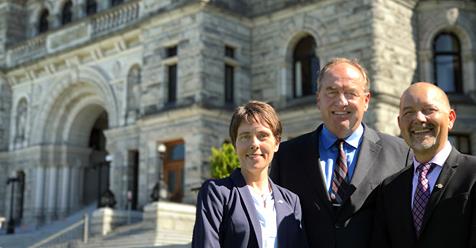Finance
Modernizing & streamlining government’s procurement process: an opportunity for innovation
Today, the Ministry of Citizens’ Services announced that it is modernizing and streamlining the government procurement process in order to better support BC businesses.
I welcome this initiative, which we also called for in our election platform, but in my view all government supports for small businesses and entrepreneurs should be modernized to respond to the changing needs of business and to ensure that we are doing everything we can to support these innovative British Columbians.
Below is the media release we issued in response to the government’s announcement.
Media Release
Weaver welcomes new government procurement process, calls for comprehensive streamlining of support for innovators
For immediate release
June 25, 2018
VICTORIA, B.C. – Andrew Weaver, leader of the B.C. Green Party, welcomed government’s announcement that it is streamlining procurement to better support B.C. innovators. Weaver added that the government should streamline and modernize all supports for B.C. small businesses and innovators.
“This is a good first step towards supporting B.C. innovators and demonstrates why government should streamline and modernize all support for entrepreneurs,” said Weaver.
“Government needs to be a leader in ensuring that we are invested in the success of B.C. companies. One of the biggest challenges I hear from small businesses and start-ups is that government programs and support initiatives are disparate and cumbersome to navigate. Additionally, business models and the needs of entrepreneurs are evolving due to the changing nature of our economy. Government procurement is an important piece of the puzzle, but there are many other programs that help businesses grow. By ensuring that government programs are responsive to the changing needs of business and making them easier to navigate, we can ensure we are providing useful, efficient support for our homegrown innovators.
“Innovation-driven industries, be they in clean tech, high tech or value-added resources, are undoubtedly the future of B.C.’s economy. Not only are these industries leading the global economy, they provide well-paying jobs and are compatible our province’s strategic strengths and values. I am pleased that key elements of our economic plan to support these industries, the Innovation Commission and the Emerging Economy Task Force, have been adopted by the B.C. NDP government through our Confidence and Supply Agreement. I look forward to continuing to work closely with government to support the development of a thriving, innovative 21st century economy.”
-30-
Media contact
Jillian Oliver, Press Secretary
+1 778-650-0597 | jillian.oliver@leg.bc.ca
Finance budget estimates: Protecting the ALR from speculation
Over the last year or so I have twice (February 2017 and October 2017) introduced a bill to protect agricultural from continuing to be subject to speculative investment activity.
Today during budget estimates for the Ministry of Finance I asked the Minister why her government had neither applied the foreign buyers tax nor the speculation tax to land in the ALR. In particular, I sought answers to why her government is not stepping in to stop prime farmland being carved up and converted into mega mansions.
Below I reproduce the video and text of our exchange.
Video of Exchange
Text of Exchange
A. Weaver: I just have a couple of questions in two areas to finish my estimates questions to the Finance Minister. The first is in the area of ALR protection. The ALR was left unprotected from the measures announced in the budget to cool the market for the residential real estate sector, which has encouraged speculation in ALR. My first question is: why didn’t the foreign buyer tax and the speculation tax apply to the ALR? And why was, for example, foreign ownership not restricted to the ALR, like has been done in areas across Canada, including Alberta, Saskatchewan, Manitoba, Quebec and PEI?
Hon. C. James: Thank you to the member for the question. I think there are two pieces I just want to focus on.
I think the first one is…. As the member will know, there’s a comprehensive policy review going on with the Minister of Agriculture right now in looking at a whole range of issues related to agricultural land. We’re doing our policy work — side by side, I guess, is the best way to describe it — along with the work that’s being done in the Agriculture Ministry. So we don’t want to either get ahead or be duplicating work that’s going on.
As the member will know, there was a large consultation done, and so people were giving their feedback. To look at further work that needs to be done around the agricultural land, we’re doing that policy review, as I said, along with the Agriculture Minister.
But I think it’s important to note that both the foreign buyers tax and the speculation tax do apply to houses, to the residential property that’s on agricultural land. I know the member’s speaking about a broader base when it comes to the agricultural land, but in fact, those taxes do apply to the class 1 residential housing that is on agricultural land if they’re in the areas that are covered by those taxes.
A. Weaver: Yes indeed, I was concerned about the broad, bare land of agricultural land that can be purchased that does not have a foreign buyers tax. Then Richmond council can be approached, and that land could then have a mega-mansion put on it, which was the subject of the concern being expressed here.
In the budget, the minister stated that she’d be changing the tax treatment of residential property in the ALR in order to close property tax loopholes. My question is then: how are you changing property tax treatment, and when can we expect to see this done?
Hon. C. James: We’re looking at the changes. These are draft changes to the School Act to exclude ALR properties that are in the residential property class from the 50 percent land exemption. We’re going through that process right now, again, as I said, in tandem with the work that’s going on in the Agriculture Ministry. This would require changes, so we certainly hope it’ll come by the fall.
A. Weaver: Again, the review. We’ve been talking about the review, and the Minister of Agriculture is indeed undertaking such a review. But in fact, we’re not waiting for the results of the review before changing the tax treatment on residential property.
We know what’s happening in an ongoing fashion in Richmond is that the speculation and mega-mansions are devouring ALR there. For example, last year, Richmond lost 50 farms due to mega-mansions. We can’t, frankly, afford to wait a year to see more action.
Why are we not taking immediate steps now to impose the foreign buyers tax and the speculation tax on the ALR land? What is stopping the minister from doing that?
Hon. C. James: I certainly appreciate the urgency of this issue. I appreciate the examples that have come forward, particularly in Richmond, as the member mentions. They are issues right now and challenges right now. But there is, as I said, the comprehensive review going on. We need to make sure that…. Many of these changes have to happen through different acts, not through one act.
For example, the changes to the school tax related to the school tax on agricultural land also have to be changes to the Assessment Act. Again, we don’t want to piecemeal it. We want to make sure that the changes that we make are really going to make a difference. That’s why we’re working together with the Agriculture Ministry.
There is an opportunity, hopefully, in the fall to bring forward those changes, to have coordinated with the feedback that people gave and to be able to make a comprehensive change that will prevent the kinds of examples that the member has raised.
Finance budget estimates: When will the BC Government close the bare trust loophole
It’s been more than four years now since I started calling on government to close the bare trust loophole which is being exploited to provide cover for anonymous real estate transactions as well as to avoid paying property transfer and, potentially, capital gains taxes.
A bare trust is a legal entity that allows for the separation of beneficial and legal ownership. The beneficial owner of a property is the person or persons who make all the decisions concerning such things as rent, repairs, management, sale etc.; they are also the person or persons who receive all the revenue from and arrange financing for the property. The trustee of the bare trust has no substantive decision-making capacity as they simply act upon the instructions of the beneficial owner. Typically the trustee is a corporation that has no other purpose but to act as a trustee for the bare trust and for which the beneficial owner owns all the shares.
Now here’s the loophole. Suppose you own a home or apartment building that you want to dispose of. If you simply transferred title, like most of us do when we sell a home, the purchaser would have to pay the property transfer tax.
But if instead the property is in a bare trust where the trustee is a company, then you will pay no tax. All you have to do is sell your shares in the company for 1$ (the company has no assets anyway), and sell the “beneficial ownership” rights of the property to a third party via a “bare trust agreement” which is not registered at the Land Title Office. Since no change in title occurs, no tax is paid.
Today during budget estimates for the Ministry of Finance I asked the Minister once more as to what the hold up is. While I appreciate that government is now collecting data on beneficial owners and sharing that data with the Canadian Revenue Agency (thereby potentially giving the CRA the ability to crack down on capital gains evasion), she is still resistant to do what Ontario did ages ago and apply the property tax to transfer of beneficial ownership rather that to transfer of title.
Below I reproduce the video and text of our exchange.
Video of Exchange
Text of Exchange
A. Weaver: I’d like to pivot to the issue of beneficial ownership and bare trust, a key issue and aspect of both the B.C. NDP and B.C. Green election campaigns. As the minister will know, I’ve been calling on government — both past government and present government — to close this loophole for years now.
In this budget, we’ve taken some steps, which I recognize, requesting more information about beneficial ownership on property transfer tax forms, as well as establishing a beneficial ownership registry. But we need to do more than this, frankly, and rather than just collecting information on the beneficial ownership, we need to take steps to actually close the loophole — as was done decades ago in Ontario in direct response to seeing some shenanigans occurring in the real estate sector.
We know that the market has already discounted this, and the market had expected government to announce that the measures would have been taken in their budget.
I have two questions in this regard, and then I’ll conclude. What information are we currently collecting about beneficial ownership on PTT forms — that’s property transfer tax forms — and what additional information are we collecting now? When do these changes come into effect, and what are the purposes of collecting this additional information? What do you expect the impacts to be from gathering this information?
Hon. C. James: Thank you for the question. This is an issue that the member has been raising for a while, and it’s certainly a piece that we’re keen on moving on. I think there are some lessons to be learned from the Ontario example, where Ontario, again, didn’t do the collecting of the information and so had some challenges when it came to implementing the tax that they’re looking at.
We will be starting, as the member has said, with changes coming in the fall on information that’s collected. The best way probably to describe it is it’ll basically be look-through rules, so it will provide an opportunity for us to look at the owners of the land, regardless of what structure they’ve put in place. All that information will be held by the Ministry of Finance.
We will be bringing in, as well, information-sharing rules that will be put in place, particularly with the CRA, so we have the immediate opportunity to be able to look at tax loopholes or tax fraud if it’s there. That’ll give us a chance to be able to do that. Then, when we have the information, that gives us the next step to be able to look at. Whether it’s Ontario or other jurisdictions or other ideas and approaches, it’ll give us an idea of the challenges and the ability to be able to determine further action.
A. Weaver: To be fair, I frankly don’t think that’s good enough. We are, right now, proposing a speculation tax, which is causing chaos in the real estate sector because we don’t have information, and we’re making exemptions as we move along.
We have a clear understanding of what the bare trust loophole is being used for in the residential property. We know you don’t have to go and collect data to know exactly what’s going on. Talk to realtors. Talk to commercial developers. Talk to bankers. Talk to accountants.
We know that properties are being purchased in trust. Those shares are owned by a corporation, and those corporation shares are flipped and switched. We know that that’s happening with offshore companies as well, and we know that that is fuelling the speculation that we truly want to deal with in the housing market.
The spec tax is not dealing with speculation. The spec tax is a paper wealth tax. Whereas a measure that we could take to actually deal with speculation, a measure that was dealt with in Ontario…. I’m told it was dealt with in Ontario precisely because of concerns about money laundering that was happening at the time in the housing market there in Ontario. The tax went on to the beneficial ownership transfer.
It is critical, because you buy at home, a mega-home, and you buy it for, say, $2 million in a trust, and you can flip that five times. You can launder money in this flipping, and there is no record. You’re collecting information, sure. But there’s property transfer tax avoidance, which should be there to discourage this behaviour.
Now, the bare trust existed…. There are reasons historically why it was important to have these properties in trust, particularly in commercial properties. But it is being abused in the residential market.
I’ll conclude, then, by saying I don’t think it’s appropriate not to close a loophole now. I think we have a measure to truly deal with speculation right now. The Attorney General, the member for Vancouver–Point Grey in opposition, pointed this out. The government said they would do it. They campaigned on doing it. Here we are a year later. We’re collecting data about hypothetically doing it down the road while implementing, at the same time, a speculation tax that is actually not dealing with speculation.
So it’s a plea. Why is the minister not standing up and closing this loophole that is being exploited right now in British Columbia and is leading to speculation — instead, taking the steps to introduce a tax that doesn’t actually deal with speculation but instead conflates two issues? One is the issue of satellite families; the other, the issue of vacancy.
Hon. C. James: I appreciate the member’s urgency around this. We feel the same urgency, but we also want to make sure, as I said, that we provide the opportunity to really get at what we need to get at and to get at the individuals we need to get at. I think, as the member has described well, there is all kinds of discussion out there. There are all kinds of people talking about examples that they know of where people who are very sophisticated at tax planning are utilizing these opportunities.
What we’re doing first is figuring out who owns what. That’s a critical piece because right now there isn’t a registry in place. There isn’t an example in place that gives us that. The work we’re doing right now will help us to do that. It’ll help us to build a registry to determine who’s incorporating where. It’ll require people, when they incorporate, to actually register that. So again, we’ll have a tracking around where things have occurred, where people are utilizing the opportunity to be able to avoid paying the correct taxes.
Then the next step, obviously, is to take action. But this will still give us the opportunity to share that information with the CRA and go after existing taxes that are not being paid. I don’t want the member to believe that this does nothing. In fact, it provides us with the opportunity to share that information with the CRA to be able to deal with taxes that aren’t being paid now or opportunities that people are trying to utilize to not pay taxes now. This will give us a chance to do that by the fall.
Further steps then can come after we’ve got the registry in place and we have the opportunity to address it.
Introducing a bill to enable BC companies to be incorporated as benefit corporations
Today in the Legislature I introduced Bill M216: Business Corporations Amendment Act, 2018.
The proposed amendment to the Business Corporations Act will create a new Part 2.3 in the Act that enables companies to become benefit companies. These companies will have to meet certain requirements, including:
- Committing in their articles to operate in a socially responsible and environmentally sustainable manner, and to promote specific public benefits;
- The directors must act honestly and in good faith to pursue public benefits and consider the interests of persons affected by the company’s conduct
- Reporting publicly against an independent third party standard.
The choice to become a benefit corporation status is completely voluntary and has no impact on other existing corporations, other corporate forms, taxes or government regulation
It’s generally recognized that Canadian corporate law does not have a strict “shareholder primacy” rule as the US does, so directors of companies in Canada have more discretion to pursue a broader mandate beyond maximizing shareholder profits. However, this legislation is needed to
- Provide clarity for directors and shareholders about the nature and mandate of the company – avoid the risk of a shareholder challenge regarding the director’s duties;
- Provide certainty for impact investors of the nature and mandate of the company;
- Enable companies to attract capital while being true to their mission as they grow;
- Protect the vision of the founders of benefit companies from shareholder challenges;
- Provide a simple framework for companies to adhere to that is legally and commercially recognized.
This legislation would also encourage more companies to pursue a socially responsible and environmentally sustainable approach to business, creating beneficial outcomes for society as a whole and leveraging the power of business to help us to tackle significant social and environmental challenges.
Below I introduce the video and text of the introduction of this bill.
Video of Bill Introduction
Text of Bill Introduction
A. Weaver: I move that a bill intituled the Business Corporations Amendment Act, 2018, of which notice has been given, be introduced and read a first time now.
This bill amends the Business Corporations Act, by adding a new part 2.3 to the act that would give companies the ability to incorporate as benefit companies. Doing so would provide these companies with the legal framework to operate in an environmentally sustainable and socially responsible way and to pursue public benefits, in addition to pursuing profits.
Benefit corporations differ from community contribution companies — known as C3 companies — which are hybrid businesses subject to an asset lock. Benefit companies would be required to meet standards of transparency and accountability by reporting their work against an independent, third-party standard.
By incorporating as benefit companies, businesses would achieve clarity and certainty for their directors and investors about their goals and mandate, thus enabling them to attract capital investment while staying true to their mission as they grow.
Companies that pursue a triple bottom line are on the cutting edge of rethinking the role of business in the 21st century and helping us tackle our most pressing, social and environmental issues. Government needs to support and encourage business to take on this role, and this bill is one way to do just this.
Mr. Speaker: The question is first reading of the bill.
Motion approved.
A. Weaver: I move that the bill be placed on the orders of the day for second reading at the next sitting of the House after today.
Bill M216, Business Corporations Amendment Act, 2018, introduced, read a first time and ordered to be placed on orders of the day for second reading at the next sitting of the House after today.
Media Release
Weaver introduces legislation to support companies pursuing environmental and social goals
For immediate release
May 14, 2018
VICTORIA, B.C. – Andrew Weaver, leader of the B.C. Green Party caucus, introduced legislation to enable B.C. businesses to incorporate as benefit companies. The legislation would establish a legal framework for companies pursuing social and environmental goals, rather than just profit.
“B.C. is home to incredibly innovative companies that want to play a bigger role in addressing the challenges and opportunities our province faces,” said Weaver.
“This legislation recognizes the important work being done by companies that want to have a social and environmental mission driving their business model, in addition to a profit motive. By extending legal recognition to benefit companies, B.C. will encourage more businesses to adopt this innovative business model.
“Moreover, this legislation is part of positioning our province to be a leader in the cutting edge of global economic trends. As the world turns to solutions to address major issues like climate change and technological innovation, we are seeing shifts in consumer patterns and behaviour, particularly among younger demographics. By becoming the first jurisdiction in Canada to legally acknowledge benefit companies, B.C. can best position our economy for success.”
The legislation would amend the Business Corporations Act, creating a new Part in the Act that enables companies to incorporate as benefit companies in BC. Companies would be required to commit to operating in a socially responsible and environmentally sustainable manner, and to promote specific public benefits. They would also need to report their progress against an independent third-party standard.
This legislation would ensure mission-driven companies can stay true to their mission as they grow. It is also important for allowing mission-driven companies to attract capital by providing investors with certainty about the mandate of the company, without being overly prescriptive with regards to how companies must spend profits. According to B Lab, benefit companies, which are legally recognized in over 30 US States, have raised nearly $2 billion in capital.
Weaver’s bill is his caucus’ first bill to be put through the official legislative drafting process. If passed, this legislation could become the first Private Member’s Bill from an opposition party member to be passed directly into law in British Columbia.
-30-
Media contact
Jillian Oliver, Press Secretary
+1 778-650-0597 | jillian.oliver@leg.bc.ca
Wondering why zero emission vehicles aren’t exempt from the PST surtax
Yesterday during committee stage of Bill 2: Budget Measures Implementation Act, 2018 I rose to ask the Minister of Finance why her ministry did not exempt zero emission vehicles from the PST surtax that they are now applying to higher end cars. As I note in the text and video exchange reproduced below, early adopters of new technology typically heavily subsidize the research and development (R and D) costs of such technology. These early adopters play a critical role in ensuring that new innovations ultimately become affordable for mainstream society.
In my opinion, zero emission vehicles should have been exempted from this surtax.
Text of Exchange
A. Weaver: The question I have for this section, I’ll ask it once and not repeat it for the other sections. It’s with respect to different types of classes of vehicles. I recognize that the minister had outlined the existing legislation and the taxes that apply below $125,000.
My question to the minister is this. To preface it, it’s that we know, in certain sectors, that early adopters are the ones that pay the R and D for new technology to emerge. If we go and look at flat screen televisions, the people who bought the first flat screens paid thousands and thousands of dollars. Now they’re literally giving them away when you sign deals — left, right and centre.
My question is: did the minister or her staff not think about exempting hydrogen fuel cell electric vehicles from this tax? That is, with recognition that it is those early adopters that are paying the R and D in this new and emerging technology that allows others to actually buy these technologies, which is a direction we want to go.
So my question is: why did the ministers not exempt zero-emission vehicles from this additional PST? Ultimately, we want to tax that which we don’t want, and we want to not tax that which we do want. These are zero-emitting vehicles.
Hon. C. James: Thank you to the member for the question. In fact, we did take a look at battery-electric vehicles available in British Columbia. We did look at prices. The member is quite right. It’s obviously an area we want to incent support for.
If you take a look…. I’ll just give you some prices of the base models. I recognize that there are models that could be much more extreme than this. But if you look at the base models, for example, of Teslas — a Model 3 or Model S or Model X — those are all under $125,000. We feel that that fits within the existing bill.
A Nissan LEAF, for example, is $35,000; a Fortwo electric drive, $29,000. If you take a look at the prices — a BMW i3 is $50,000 — they’re all well within the range and under the $125,000. We felt that that was a reasonable approach and didn’t penalize, as the member has suggested, the kind of behaviour that we want to incent.
A. Weaver: Just to follow up, though. In fact, as the technologies emerge…. You couldn’t buy a hydrogen fuel cell. We don’t know whether that’s going to be the technology of tomorrow. But suppose a company decides to put that on the market. It’s zero-emitting. We don’t know that that…. We would want to let the early adopters actually pay the price, if they want to have that niche article, and not tax them.
In addition, we’re now talking about driverless vehicles. The high-end Teslas…. The Model X actually has a driverless component to it, and to get $125,000…. It goes rather quickly, and also the other exemptions for above 50 and above 67 too.
Again, I recognize the minister says that they took a look at the cars. But the reality is that the reason why we can buy a Nissan LEAF now for $35,000 is precisely because people were willing to pay $100,000 plus for those Teslas, and you got the investment in the battery technology that led to the mass production of the smaller cars.
Again, I would hope that the minister would recognize that this has been viewed very negatively within the electric vehicle sector of our society because of the fact that it’s not differentiating between those cars that pollute and those cars that don’t. It’s being viewed simply as a punitive measure on those early adopters who are trying to actually get the market going in the direction they wish it to go.
Hon. C. James: Thanks to the member. I appreciate that. But again, when we’re taking a look at an increase in the purchase price of vehicles over $125,000 and over $150,000, I think that’s a reasonable approach. It doesn’t mean that those won’t be adjusted over time as additional vehicles come on the market.
I certainly know that most companies are looking at, when they get their vehicles on the market, as much affordability as they can. There are certainly other incentives that are often offered, whether it’s a rebate for an electric vehicle or otherwise. There are other kinds of rebates that occur as well.
We felt that this was a fair process. As I said, when I take a look at the models that are on the market, I think even Tesla…. When you’re looking at $122,600, that’s still a fairly pricey vehicle. We think $150,000 and $125,000 are a reasonable approach.
But I take the member’s point and understand that, always, there are opportunities to go back and take a look, as I said earlier, at a number of taxes we’ve talked about. There are always opportunities at the end of each year to take a look at their impact, to take a look at whether they’ve been effective or not and adjust as may or may not be needed.








